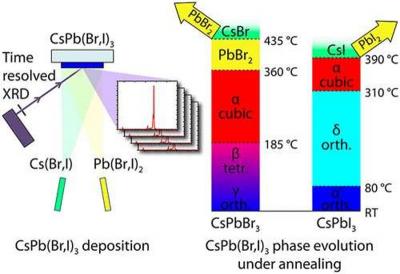Scientists at the Martin Luther University of Halle Wittenberg have investigated a new process for perovskite solar cell production, which they say could allow for creation of perovskite thin film layers with better long-term stability than others have achieved.

The process, co-evaporation, is already widely used in other industries. It consists of heating precursor materials in a vacuum, until they evaporate, and then growing a layer of crystals onto a colder glass substrate.
The team was able to produce perovskite layers which did not decay until reaching a temperature of 360°C. Using x-ray analysis, the team also observed the growth and decay processes in real time.
The researchers in this paper say that they were able to gain important insights into this growth and decay through their observations, and that their research points to a process which could be applied to large-scale manufacturing.



